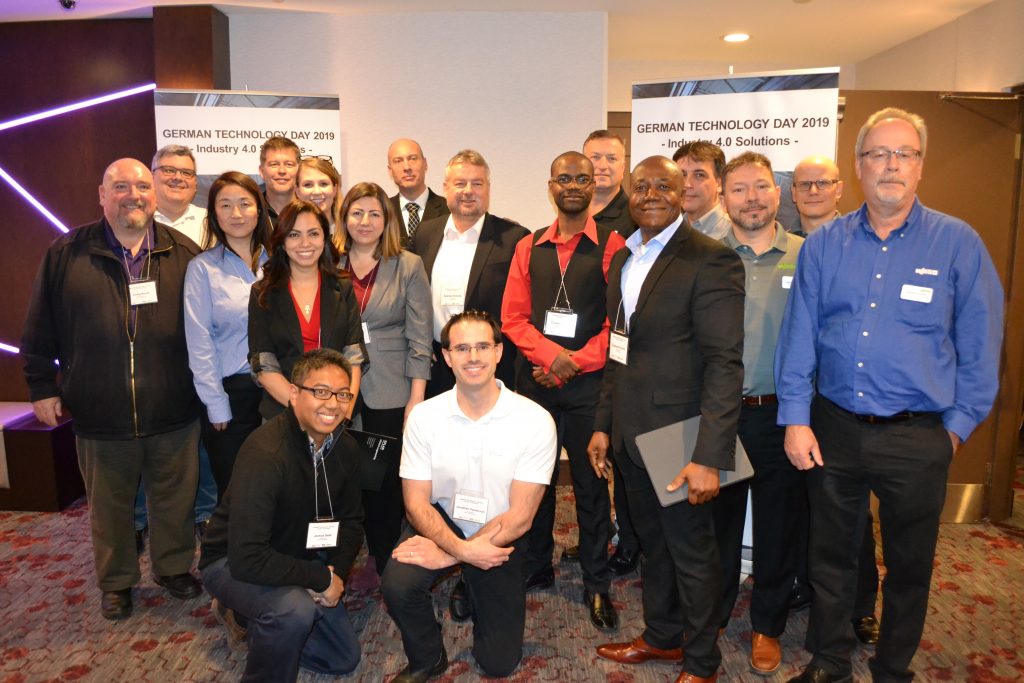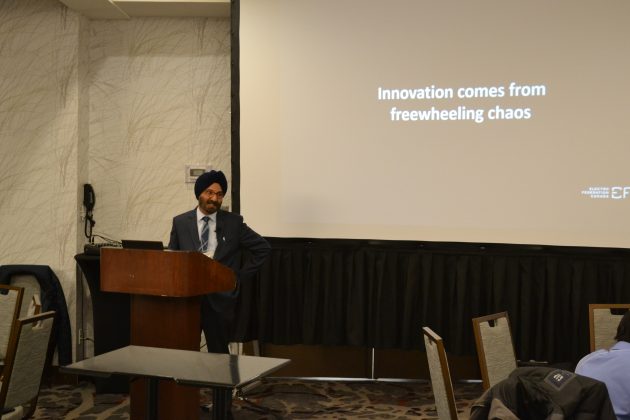
German Technology Days introduce Canadian manufacturers to Industry 4.0 solutions
November 22, 2019
By
Kristina Urquhart
 Staff from Rittal, Pilz, WAGO and EPLAN at the German Technology Days event in Mississauga, Ontario on November 19, 2019. Photo: Manufacturing AUTOMATION
Staff from Rittal, Pilz, WAGO and EPLAN at the German Technology Days event in Mississauga, Ontario on November 19, 2019. Photo: Manufacturing AUTOMATION A group of German-owned companies this week addressed Canadian manufacturers still unsure of the value of automation, or how Industry 4.0 practices can benefit their operations.
The Canadian branches of Rittal, EPLAN, WAGO and Pilz Automation Safety gathered for what they dubbed “German Technology Days,” first in Mississauga, Ontario on November 19, then in Kitchener, Ontario on November 21, for customer information and thought leadership sessions covering Industry 4.0 and Industrial Internet of Things (IIoT) solutions.
“There is no ‘the’ Industry 4.0 solution,” said Andreas Sobotta, chief executive officer of Pilz Canada, as he opened the event. He stressed the need for multiple vendors to come together to achieve comprehensive solutions that connect the whole manufacturing value chain.

Andreas Sobotta, CEO of Pilz Canada, at the German Technology Day event in Mississauga, Ont. Photo: Manufacturing AUTOMATION
Introducing Industry 4.0
As such, the event sessions showcased solutions that maximize workflow efficiency, reduce cost and time of labour, and leverage data to effect operational change.
“Data is now real,” said Ron Bin, field application engineer for WAGO, of the Industry 4.0 era. “Before, you may have had data, but it was often erroneous data.”
Andre Bousette, regional sales manager for Rittal Systems Ltd., demonstrated how his company uses automation and industry partnerships to deliver Industry 4.0–enabled solutions.
Rittal has developed its own CNC and laser machines that automate aspects of custom enclosure builds. A client can either set up their own machine, or use one of Rittal’s nationwide modification centres to process their orders. To manually cut, strip and crimp a roll of wires takes 130 seconds, but Rittal’s Perforex machine can do the same job in 45 seconds.
“Those little inefficiencies add up,” said Bousette.
Rittal works with software company EPLAN to establish a digital twin – or virtual representation – of the enclosure build. EPLAN feeds that information to the engineering team, and then transfers it all to the electronic bill of materials (eBOM), providing a single source of truth. Connecting that eBOM to your organization’s ERP system – so that same information can be sent to the manufacturing floor – is a critical part of Industry 4.0 concepts.
In his presentation, Joao Paulo Vaz, machinery safety consultant at Pilz Canada, highlighted the company’s access control technology through the new PITmode, a solution that uses selector switches to regulate operator machine access. It is Industry 4.0–enabled in that it allows for remote monitoring of operator usage.

Gurvinder Chopra, VP standards Electro-Federation Canada, at German Technology Day, November 19, 2019. Photo: Manufacturing AUTOMATION
Standardization yields innovation
More than investment, the solutions presented at German Technology Days represent a fundamental shift in mindset for manufacturers: that in order to achieve the digital transformation required to compete on a global level, companies must embrace innovation.
Gurvinder Chopra, vice-president of standards and regulations for Electro-Federation Canada, said in his lunchtime keynote address that innovation leads to growth, increased competitiveness and the ability to attract talent.
“Companies that innovate are able to scale up,” he said. “But planning becomes impossible if there are no guidelines.”
Industry standards are the backbone of scalable transformation, Chopra said, and lead to continuous improvement when coupled with innovative practices. He pointed to Germany, the birthplace of Industry 4.0, as a country that has fostered an environment that spurs innovation, whether through government funding, industry partnerships or standardization.
“Canada has not been able to keep the pace of innovation,” said Chopra. “We need to look at standards to help – but the right talent needs to be available to make it happen.”
He said that not enough industry stakeholders are taking advantage of the standards development platforms offered in Canada, which can offer stability as manufacturers test out new best practices and work toward shared goals.
“If you are not part of that standards community, your competitors will be making your decisions for you,” said Chopra. “Make sure you are a part of the table.”
Advertisement
- Emerson introduces wireless vibration monitor for plant equipment
- WSIB to provide $140M in rebates for successful safety programs